(完整)外研版八年级下册现在完成时
外研版英语八年级英语句型及语法(英语现在完成时)及答案解析百度文库
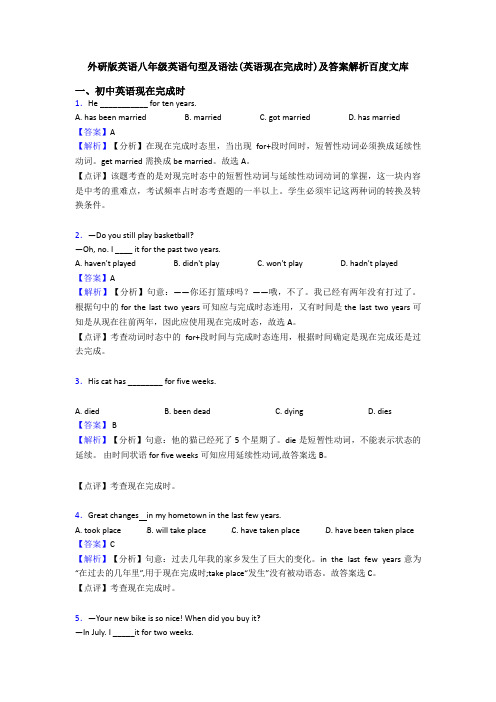
外研版英语八年级英语句型及语法(英语现在完成时)及答案解析百度文库一、初中英语现在完成时1.He ___________ for ten years.A. has been marriedB. marriedC. got marriedD. has married【答案】A【解析】【分析】在现在完成时态里,当出现for+段时间时,短暂性动词必须换成延续性动词。
get married需换成be married。
故选A。
【点评】该题考查的是对现完时态中的短暂性动词与延续性动词动词的掌握,这一块内容是中考的重难点,考试频率占时态考查题的一半以上。
学生必须牢记这两种词的转换及转换条件。
2.—Do you still play basketball?—Oh, no. I ____ it for the past two years.A. haven't playedB. didn't playC. won't playD. hadn't played【答案】A【解析】【分析】句意:——你还打篮球吗?——哦,不了。
我已经有两年没有打过了。
根据句中的for the last two years可知应与完成时态连用,又有时间是the last two years可知是从现在往前两年,因此应使用现在完成时态,故选A。
【点评】考查动词时态中的for+段时间与完成时态连用,根据时间确定是现在完成还是过去完成。
3.His cat has ________ for five weeks.A. diedB. been deadC. dyingD. dies【答案】 B【解析】【分析】句意:他的猫已经死了5个星期了。
die是短暂性动词,不能表示状态的延续。
由时间状语 for five weeks可知应用延续性动词,故答案选B。
【点评】考查现在完成时。
4.Great changes in my hometown in the last few years.A. took placeB. will take placeC. have taken placeD. have been taken place 【答案】C【解析】【分析】句意:过去几年我的家乡发生了巨大的变化。
外研版英语初二英语英语现在完成时知识点总结含答案解析百度文库
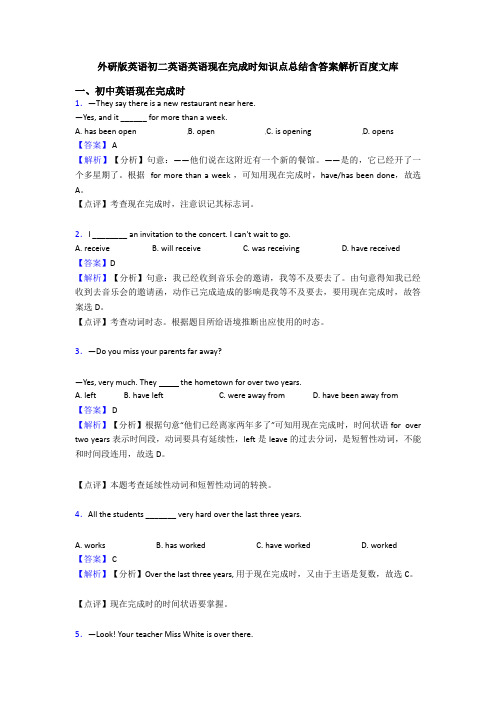
外研版英语初二英语英语现在完成时知识点总结含答案解析百度文库一、初中英语现在完成时1.—They say there is a new restaurant near here.—Yes, and it ______ for more than a week.A. has been openB. openC. is openingD. opens【答案】 A【解析】【分析】句意:——他们说在这附近有一个新的餐馆。
——是的,它已经开了一个多星期了。
根据 for more than a week ,可知用现在完成时,have/has been done,故选A。
【点评】考查现在完成时,注意识记其标志词。
2.I ________ an invitation to the concert. I can't wait to go.A. receiveB. will receiveC. was receivingD. have received【答案】D【解析】【分析】句意:我已经收到音乐会的邀请,我等不及要去了。
由句意得知我已经收到去音乐会的邀请函,动作已完成造成的影响是我等不及要去,要用现在完成时,故答案选D。
【点评】考查动词时态。
根据题目所给语境推断出应使用的时态。
3.—Do you miss your parents far away?—Yes, very much. They the hometown for over two years.A. leftB. have leftC. were away fromD. have been away from【答案】 D【解析】【分析】根据句意“他们已经离家两年多了”可知用现在完成时,时间状语for over two years 表示时间段,动词要具有延续性,left是 leave的过去分词,是短暂性动词,不能和时间段连用,故选D。
【点评】本题考查延续性动词和短暂性动词的转换。
外研版英语八年级下册 Module 2 现在完成时课件ppt

字母,再加“-ed”stop→stopped→stopped
irregular verbs 不规则动词
课本 Page 126-129
put ---- put ---- put AAA come ---- came ---- come ABA spend ---- spent ---- spent ABB am/is ---- was ---- been ABC
Try these! has/have done
将下列句子改为现在完成时
1. I buy a pair of shoes.
I _h_a_v_e_b_o_u_g_h_t_ a pair of shoes.
2. She went out.
3. He tells her everything.
4. Do you answer all the questions?
(翻译时常带有:…过;已经 …; 曾经…)
Past Participle 过去分词
规则动词过去分词的构成规则&规则动词 过去式的构成规则相同。 1. 一般在动词尾加“-ed”. work→worked→worked 2. 以“e”结尾的动词,词尾加“-d”. live→lived→lived 3. 以“辅音字母+ y”结尾的动词,将“y”变为 “i”,再加“-ed”。
5. They didn’t meet each other before.
2.She went out.
She __h_a_s_g_o_n__e__ out.
3. He tells her everything.
He ___h_a_s_t_o_ld___ her everything.
外研版英语八年级下册:Module 4 Unit 3 Language in use. 现在完成时
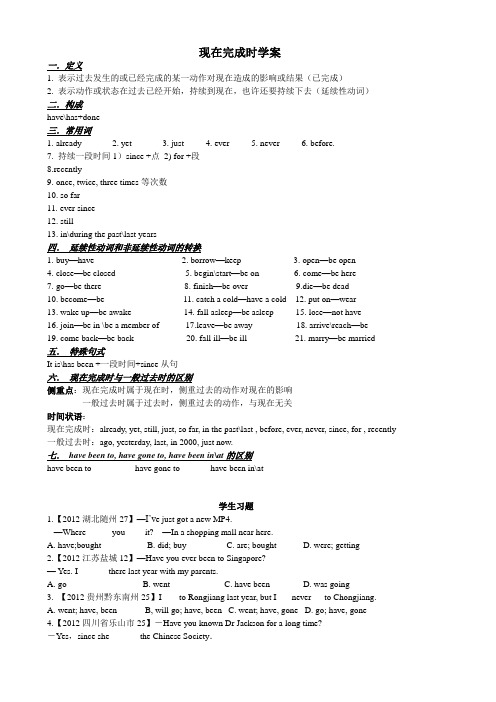
现在完成时学案一.定义1. 表示过去发生的或已经完成的某一动作对现在造成的影响或结果(已完成)2. 表示动作或状态在过去已经开始,持续到现在,也许还要持续下去(延续性动词)二.构成have\has+done三.常用词1. already2. yet3. just4. ever5. never6. before.7. 持续一段时间1)since +点2) for +段8.recently9. once, twice, three times等次数10. so far11. ever since12. still13. in\during the past\last years四.延续性动词和非延续性动词的转换1. buy—have2. borrow—keep3. open—be open4. close—be closed5. begin\start—be on6. come—be here7. go—be there 8. finish—be over 9.die—be dead10. become—be 11. catch a cold—have a cold 12. put on—wear13. wake up—be awake 14. fall asleep—be asleep 15. lose—not have16. join—be in \be a member of 17.leave—be away 18. arrive\reach—be19. come back—be back 20. fall ill—be ill 21. marry—be married 五.特殊句式It is\has been +一段时间+since从句六.现在完成时与一般过去时的区别侧重点:现在完成时属于现在时,侧重过去的动作对现在的影响一般过去时属于过去时,侧重过去的动作,与现在无关时间状语:现在完成时:already, yet, still, just, so far, in the past\last , before, ever, never, since, for , recently 一般过去时:ago, yesterday, last, in 2000, just now.七.have been to, have gone to, have been in\at的区别have been to have gone to have been in\at学生习题1.【2012湖北随州27】—I’v e just got a new MP4.—Where _____ you ____it? —In a shopping mall near here.A. have;boughtB. did; buyC. are; boughtD. were; getting2.【2012江苏盐城12】—Have you ever been to Singapore?— Yes. I ______ there last year with my parents.A. goB. wentC. have beenD. was going3. 【2012贵州黔东南州25】I ___ to Rongjiang last year, but I___ never___to Chongjiang.A. went; have, been B, will go; have, been C. went; have, gone D. go; have, gone4.【2012四川省乐山市25】-Have you known Dr Jackson for a long time?-Yes,since she ______ the Chinese Society.A.has joined B.joins C.had joined D.joined5.【2012四川宜宾18】—Are you a soccer player in your school?—Yes, I _____ the team two years ago. I ______ in the team for two years.A. have joined; have beenB. was joined; amC. joined; wasD. joined; have been6.【2012天津19】I have been to Shanghai. I _____ there last month.A. goB. wentC. have goneD. will go7.【2011四川泸州】Mr. Fan ___ this watch in 2005. he ____ it for 6 years.A .bought, has had B. bought, has C. has bought, has had D. has bought, had8.【2006年绍兴】--Mr. Johnson, we have found your watch.--My watch! Thank you. Where____ it?A. do you findB. have you foundC. did you findD. were you finding9 —Have you ever been to Shanghai, Mary?—Yes. I _____ there for three days with my parents last month.A. have goneB. have beenC. wentD. was10 --How long ______ he ______ a fever?--- Ever since last night.A.have, gotB. has , hadC. have, caughtD. did, have11. —These farmers have been to the United States.—Really ? When _____ there ?A. will they goB. did they goC. do they goD. have they gone12. —I have watched the game.—When ______ you _______ it?A. have; watchedB. do; watchC. did; watchD. will; watch13. —Have you read a book called Jane Eyre?—Yes. Who________it?A.writes B.has written C.was writing D.wrote14. --I have had supper.-- When ____you____it?A. have; hadB. do, haveC. did, haveD. will; have15. I ______ you for a long time. Where ______ you ______?A.Didn’t seen; did, goB. Didn’t see; have, goneC. Haven’t seen; have, beenD. Haven’t seen; have gone16. —Have you ever_______ to Haikou?—Yes,I_______ there with my family last August.A.gone;went B.been;went C.been;went to D.been;was in17 Mother __ __me a new coat yesterday. I _______ it on. It fits me well.A. had made; have triedB. made; have triedC. has made; triedD. made; tried18 --He ____to draw horses already.--When ______ he?--Last yearA. learned; hasB. learned; didC. has learned; hasD. has learned; did19 --____ you _____ the text yet ?--Yes, we ____ it two hours ago.A. Did; copy; didB. Have; copied; haveC. Have; copied; didD. Did; copy; had。
(完整word版)最新外研版八年级英语(下)现在完成时的用法.docx

`现在完成时的用法一、表示过去发生并且已经完成的动作对现在造成的影响或结果。
例如:你读过那个故事吗?Have you read that story?(“读”这一动作发生在过去,对现在造成的影响为:是否知道故事中的内容)我买了两个苹果。
I have bought two apples.(“买”这一动作发生在过去对现在造成的结果是:拥有两个苹果)(一)、构成:“助动词 have/has+动词的过去分词”(二)、句型结构:肯定式:主语 +have/has+ 过去分词 +其它。
如: I have just come back from Qinzhou.否定式:主语 +have/ has not + 过去分词 +其它。
如: I haven ’ t seen the TV play.一般疑问句: Have/ has+ 主语 + 过去分词 +其它 ?如: Has Jack finished his homework?回答:肯定: Yes, 主语 + have/has .否定: No, 主语 + haven’t/ hasn’t.特殊疑问句 : 特殊疑问词 + 一般疑问句?如: How long have you had the dog ?[当堂检测 ]完成下列句子:1.李明还没看过这本书了。
Liming ______ ______that book ______.2.他去看医生了吗?______he______ ______ see the doctor?3.我非常高兴,因为我通过这次英语考试。
I am very happy, because I ____________ the English exam.4.你在这等了多久了 ?______ ______ ______ you _____ here?5.妈妈把那本书弄丢了。
Mum_____ _____that book.6.你去哪了?Where_____you_____ ?(三)、常与现在完成时态连用的几个副词:already,just 多用于肯定句中 , yet,ever,never 多用于疑问句和否定句中。
现在完成时22-23学年外研版英语八年级下册
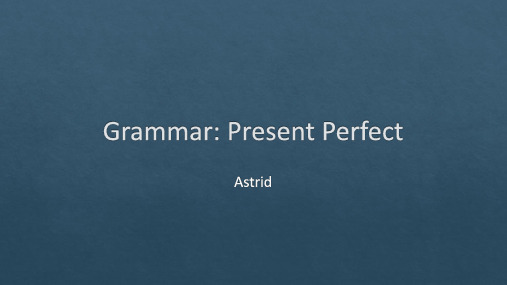
Can I play outside? I have already finis不明确的时间状语连用,如:
just,already,yet,before/ ever,never,有此类副词时,常强调动作完成,不强
调动作的持续.
1. Have you _e_v_e_r_been to Japan? 曾经,多用于疑问句 2.I have _j_u_s_t _ finished my homework. 用于助动词之后实义动词之前 3.I have finished my homework _a_lr_e_a_d_y. 用于肯定句 4.I haven’t finished my homework __y_et_. 用于否定句表达还(没)、尚(未)、仍然
A. finds B. found C. has found D. will find 5. Monica, you___ the exam!Congratulations !
A. pass B. have passed C. will pass D. are passing
现在完成时和一般过去时对比
(3) for +时间段 for two years
(4) since+时间点 since 9:00
since two years ago;
since+句子(一般过去式)
一般过去时
was/were或did(过去式)
一般过去时表示过去的动 作或状态和现在不发生联 系,强调过去的情况。
yesterday, last year, in 1990(过去某一年),two days ago, in the past,
just now
—I’ve no idea. I _____ there.
外研版八年级下册现在完成时

since + 时间点(2010,last Sunday) /since +段时间+ago (two days ago) /since + 从句 (主完从过)
how long
现在完成时 延续性动词
Strike while the iron is hot.(趁热打铁) 现在完成时与一般过去时等时态的区别
பைடு நூலகம்
Practice makes perfect.(熟能生巧)
【Underline the key words, please.(请划出关键词)】
B 4. Helen loves to talk about travel. She ____ many places.
A.has gone to
B.has been to
C 【Underline the key words, please.(请划出关键词)】
1. Miss Lin ____ a lot of work for the poor area since 2010. (2013,北京,32)
3. —Jack, I haven’t seen your uncle for a long time?
C —He _____ Shanghai on business for 2 months. 延续一段时间:been in (2013,湖北随州) A.went to B.has gone to C.has been in D.has been to
现在完成时 present perfect
现在完成时:present perfect
主语为非第三人称单数
主语为第三人称单数
1.结构:
have/has done
外研版八年级下册 Module 2 Unit 3 现在完成时 (共29张ppt)

ever, already, yet…
现在完成时的结构: has/have +动词过去分词
1.肯定句:主语+have/has+动词过去分词 I have worked. He/She has worked. They have worked.
2.否定句:主语+have/has +not 动词过去分词 I have not worked. He/She has not worked. They have not worked.
感谢观 看
THANKS
9. for+时间段
• eg:We haven't heard from her for a long time .
• The old man has died for 4 years .
10. in the last five years in the past five years
• eg:We’ve planted thousands of trees in the past five years.
现在完成时
一.现在完成时定义
• 1.表示过去的一个动作对现在造成的影响 • 2.表示过去的一个动作一直持续到现在,可 能已经完成,也可能要继续持续下去 • 3.从过去到现在某一个动作的积累程度
意义
现在 完成
时
结构
1.have + 动词过去分词 2.has +动词过去分词 (过去分词的变化规则)
标词
5. never adv. 从不
• 表示到现在为止动作从没发生过 • 放于助动词之后动词之前
•eg: He has never been to Beijing.
外研八年级下册-现在完成时(1 )18张

B 5.Harry Potter is a very nice film .I______ it twice .
A.will see B.have seen C.saw D.see
请写出下面动词的过去分词。
1. visit -- _v_is_i_te_d__ 2. ask -- _a_s_k_e_d_ 3. travel -- _tr_a_v_e_ll_e_d 4. enter -- _e_n_te_r_e_d_ 5. cry -- __c_ri_e_d__ 6. want -- __w_a_n__te_d 7. stop -- _st_o_p_p_e_d_ 8. hope -- _h_o_p_e_d_ 9. invite -- _in_v_i_t_ed__ 10. play-- _p_l_a_y_ed__
2.现在完成时的动词形式
have\has+done(动词过去分词) 助动词:have\has
动词过去分词变化规则: ①规则动词: 规则动词的过去分词的构成规则与规则动词 的过去式的构成规则相同。
②不规则动词:
动词过去分词的规则变化规律
读一读,想一想
一般动词 在词尾直接加“ ed ”
work---worked---worked visit---visited---visited
stop---stopped---stopped drop---dropped--dropped
2.现在完成时的动词形式
have\has+done(动词过去分词) 助动词:have\has
动词过去分词变化规则:
①规则动词: 规则动词的过去分词的构成规则与规则动词 的过去式的构成规则相同。
(完整)外研版八年级下册现在完成时
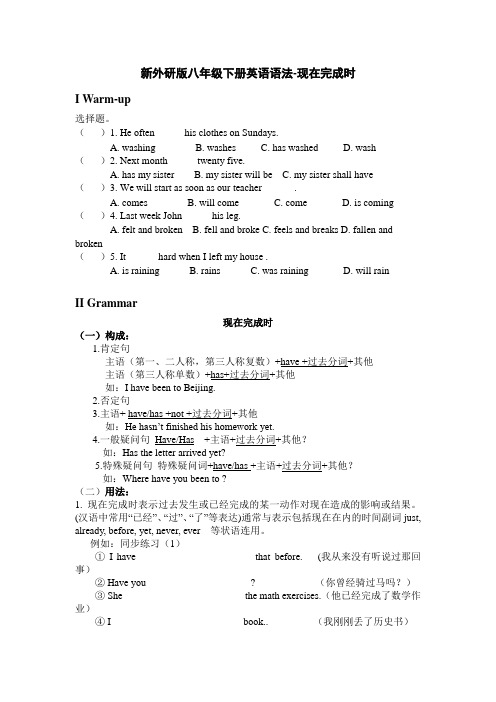
新外研版八年级下册英语语法-现在完成时I Warm-up选择题。
()1. He often______his clothes on Sundays.A. washingB. washesC. has washedD. wash()2. Next month______twenty five.A. has my sisterB. my sister will beC. my sister shall have()3. We will start as soon as our teacher______ .A. comesB. will comeC. comeD. is coming()4. Last week John______his leg.A. felt and brokenB. fell and brokeC. feels and breaksD. fallen and broken()5. It______ hard when I left my house .A. is rainingB. rainsC. was rainingD. will rainII Grammar现在完成时(一)构成:1.肯定句主语(第一、二人称,第三人称复数)+have +过去分词+其他主语(第三人称单数)+has+过去分词+其他如:I have been to Beijing.2.否定句3.主语+ have/has +not +过去分词+其他如:He hasn’t finished his homework yet.4.一般疑问句Have/Has +主语+过去分词+其他?如:Has the letter arrived yet?5.特殊疑问句特殊疑问词+have/has +主语+过去分词+其他?如:Where have you been to ?(二)用法:1. 现在完成时表示过去发生或已经完成的某一动作对现在造成的影响或结果。
现在完成时归纳总结及练习 2020-2021学年天津市外研版八年级英语下册(含答案)

2020-2021天津市外研版八年级英语下册现在完成时语法归纳总结及练习(含答案)现在完成时表示发生在过去持续到现在完成或未完成的事情,对现在造成了某种影响或产生了某种结果。
也表示到现在为止从未做过的事情。
现在完成时的谓语动词构成是:have/has +动词的过去分词(过去分词用P.P.表示),have/has叫助动词,变成否定形式是:haven’t /hasn’t +过去分词,变一般疑问句就是把have、has 提到主语前面,标点用问号, 用yes、no回答。
例如:I have ever seen the film before. I haven't seen the film. Have you seen the film before?Yes,I have. No, I haven't.动词的过去分词的变化规则和过去式的规则是一样的。
分为规则变化和不规则变化。
规则变化和动词变过去式的方法一样。
不规则变化没有一定的规律性,得需要背诵。
一:把下列动词变成过去分词:1. enter _____2. afford _______3. invite______4. try ______5. stop ______6. smell _______7. send _____8. dream _____9. do ______ 10. get ______ 11.feel ______ 12. make _____在学习现在完成时态时,我们有时用一些词加以强调或说明。
如:just(刚刚,刚才),already(已经), ever(曾经), never(从不), yet(还未). just一般用在肯定句中,放在have/has 和过去分词之间;already 用于肯定句,放在have/has 和过去分词之间或句尾。
ever一般没有句式限制,放在have/has 和过去分词之间;never表示否定意义,放在have/has 和过去分词之间;yet用于否定句或疑问句句尾,在否定句中一般翻译为:“已经”,在疑问句中一般翻译为:“尚,还未”。
现在完成时课件2022-2023学年外研版英语八年级下册

7. He _h_a__s_n_’_t_r_e_a_d(not read) the book before.
8.Her sister h_a_s__g_o__n_e (go) to Changchun. She____l_e_ft__ (leave) this morning.
9.He _h_a__s__li_v_e_d__ (live) in his hometown since he left here.
father. ❖ 5. The twins s_a_w__(see) my father just now.
选用since 或for 填空:
1.We have learned English s_i_n_c__e_ Grade Three in primary school.
We have learned English __fo__r___ five years.
10.The writerh_a_s__f_in__is_h__e_d_ (finish) several storybooks since 1990.
和过去时态的区别及联系:
I lived there 2 years ago
·past
2021
· present 2023
I have lived here for two years
❖ 1.都表示过去发生的事
❖ 2.现在完成时强调过去和现在的联系,不能和具 体的时间状语连用;
❖ 3.一般过去时强调过去发生的事或状态与表示过 去的具体时间连用(last, ago, yesterday, etc. )
❖ start/begin be on finish/ end
be over
外研版英语初二英语英语现在完成时知识点总结及解析推荐精选
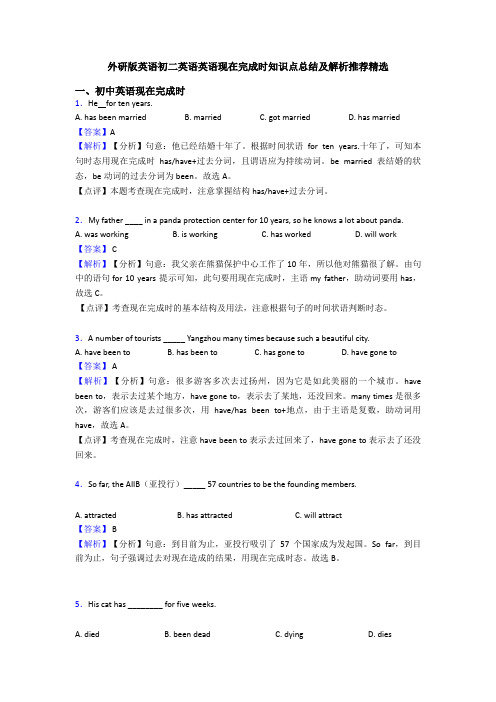
外研版英语初二英语英语现在完成时知识点总结及解析推荐精选一、初中英语现在完成时1.He for ten years.A. has been marriedB. marriedC. got marriedD. has married【答案】A【解析】【分析】句意:他已经结婚十年了。
根据时间状语for ten years.十年了,可知本句时态用现在完成时has/have+过去分词,且谓语应为持续动词。
be married表结婚的状态,be动词的过去分词为been。
故选A。
【点评】本题考查现在完成时,注意掌握结构has/have+过去分词。
2.My father ____ in a panda protection center for 10 years, so he knows a lot about panda.A. was workingB. is workingC. has workedD. will work【答案】 C【解析】【分析】句意:我父亲在熊猫保护中心工作了10年,所以他对熊猫很了解。
由句中的语句for 10 years 提示可知,此句要用现在完成时,主语my father,助动词要用has,故选C。
【点评】考查现在完成时的基本结构及用法,注意根据句子的时间状语判断时态。
3.A number of tourists _____ Yangzhou many times because such a beautiful city.A. have been toB. has been toC. has gone toD. have gone to【答案】 A【解析】【分析】句意:很多游客多次去过扬州,因为它是如此美丽的一个城市。
have been to,表示去过某个地方,have gone to,表示去了某地,还没回来。
many times是很多次,游客们应该是去过很多次,用have/has been to+地点,由于主语是复数,助动词用have,故选A。
2022-2023学年外研版英语八年级下册现在完成时课件
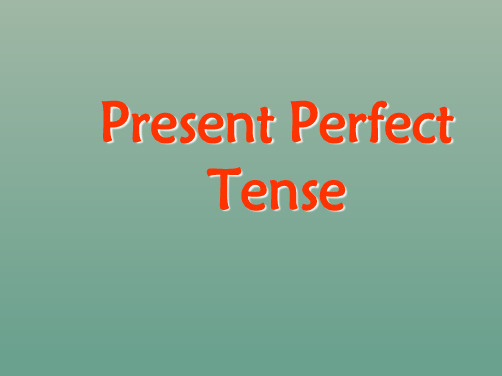
❖ 在正式英语中,含有表时间的since 从句的句 子中,主句通常用完成时;但若主句的动词 为静态动词,如be动词,也可不用完成时。
重点句型: It is/ has been+段时间+since从句 段时间+has passed+ since从句
❖ I visited your school three weeks ago. √ ❖ I have already visited your school. √ ❖ I have visited your school before. √ ❖ I have visited your school three weeks ago. X ❖ I wrote two letters last Sunday. √ ❖ I have written two letters. √ ❖ I have written two letters last Sunday. X
❖ —Yes, I have.
❖ (A)never (B)ever
(C)just
(D)yet
❖ —Zhao Lan ______already ______in this school for two years .
❖ A. was ; studying
B. will ; study
❖ C. has ; studied
❖ I__h_a_v_e__ already __s_e_e_n__ (see) the film. I __s_a_w___ (see) it last week. ❖ —When ___d_id_____ she ___le_a_v_e___(leave)? —Two hours ago. ❖ —___H_a_v_e___ you ___s_e_e_n___(see) the film before? ❖ —Yes, I __h_a_v_e____. ❖ —Where ___d_id______ you ___s_e_e___(see) it?
外研版英语 八年级下册 Module2 现在完成时
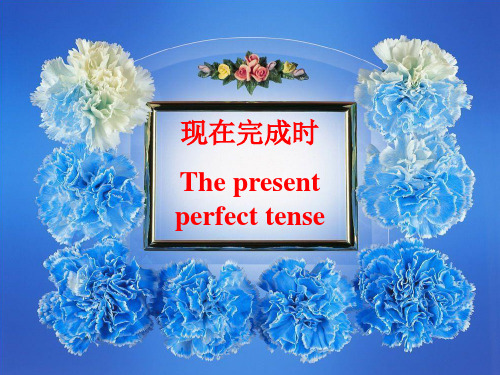
16
1. You’ve never heard ___ this new kind of plane, __ you?
Hale Waihona Puke A. / ; haven’t B. of ; haven’t C. of ; do D. of ; have
2. ---I have ______ here for two months.
---So you ______ here since two months ago.
A. come, came B. been, have been
C. been, come D. come, have been
3. He was _______ teaching _______ English.
A.sell out B.been sold out C.sold out D.sold
4.—I have been to France twice.
—Wonderful!When ________you________there?
A. have;been B. did;went C. have;gone D. did;go
in the last+段时间(最近的…)
till/until(直到)
up to now(至今)
改错
1. I has read the book. 2. He have gone to the library. 3. Have you saw the film? 4. He’s just washed his clothes, isn’t he? 5. She has finished her job last week. 6. Have you done your homework already?
八年级下册外研版英语现在完成时练习题40篇及解析含答案
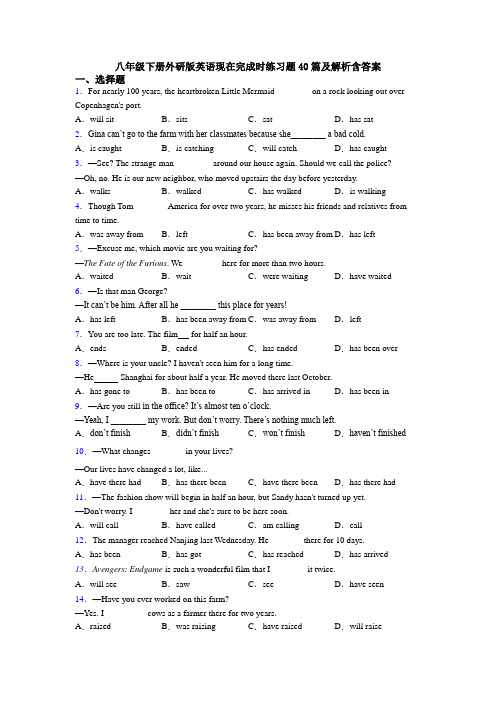
八年级下册外研版英语现在完成时练习题40篇及解析含答案一、选择题1.For nearly 100 years, the heartbroken Little Mermaid ________on a rock looking out over Copenhagen's port.A.will sit B.sits C.sat D.has sat 2.Gina can’t go to the farm with her classmates because she________ a bad cold.A.is caught B.is catching C.will catch D.has caught 3.—See? The strange man ________ around our house again. Should we call the police?—Oh, no. He is our new neighbor, who moved upstairs the day before yesterday.A.walks B.walked C.has walked D.is walking 4.Though Tom _______ America for over two years, he misses his friends and relatives from time to time.A.was away from B.left C.has been away from D.has left 5.—Excuse me, which movie are you waiting for?—The Fate of the Furious. We ________ here for more than two hours.A.waited B.wait C.were waiting D.have waited 6.—Is that man George?—It can’t be him. After all he ________ this place for years!A.has left B.has been away from C.was away from D.left7.You are too late. The film for half an hour.A.ends B.ended C.has ended D.has been over 8.—Where is your uncle? I haven't seen him for a long time.—He Shanghai for about half a year. He moved there last October.A.has gone to B.has been to C.has arrived in D.has been in 9.—Are you still in the office? It’s almost ten o’clock.—Yeah, I ________ my work. But don’t worry. There’s nothing much left.A.don’t finish B.didn’t finish C.won’t finish D.haven’t finished 10.—What changes________in your lives?—Our lives have changed a lot, like...A.have there had B.has there been C.have there been D.has there had 11.—The fashion show will begin in half an hour, but Sandy hasn't turned up yet.—Don't worry. I________ her and she's sure to be here soon.A.will call B.have called C.am calling D.call12.The manager reached Nanjing last Wednesday. He________there for 10 days.A.has been B.has got C.has reached D.has arrived 13.Avengers: Endgame is such a wonderful film that I________ it twice.A.will see B.saw C.see D.have seen 14.—Have you ever worked on this farm?—Yes. I _________ cows as a farmer there for two years.A.raised B.was raising C.have raised D.will raise15.— Mum, where's my packed lunch? —In the kitchen. I ________ you two sandwiches. A.make B.am making C.have made D.will make16.I think my father knows everything. He is my hero, he________ over 2500 books. A.reads B.read C.is reading D.has read 17.—Why don’t you go to bed, Jimmy?— Mum promised to tell me a bedtime story, but she ______ her work.A.doesn’t finish B.didn’t finish C.hasn’t finished D.won’t finish 18.My mother is a teacher. She ________ English in our school since she graduated from university.A.taught B.has taught C.is teaching D.will teach 19.The number of city parks in Lishui ______ a lot since it became a district of Nanjing. A.increase B.will increase C.increased D.has increased 20.The boy in red ___________ the football club for 3 years. He can play football very well now. A.has joined B.has been in C.joined D.was in 21.—Look! The man looks like Mr. Li.—It can’t be him. Because he with his families________Japan since last Thursday and they haven’t returned.A.has gone to B.has been to C.have been in D.has been in 22.The life we were used to_________ greatly since the computer was invented.A.has changed B.changed C.changing D.change 23.—Have you been to the Robot Restaurant in our city?—No. Although it _________ for more than a year, I’m far too busy to go there.A.has started B.has been on C.has been open D.has opened 24.Since Tencent released Wechat, it ________ one of the most popular apps in the world. A.became B.has become C.has been D.was25.―Olivia, are you sure your aunt ________back from America?―Yes. My mom told me. I'm going to see her now.A.had come B.came C.is coming D.has come26.In the sentence “I have bought a new bicycle, so I can ride to school now.”, we use present perfect tense to tell ________.A.the result of a past actionB.actions that happened in the pastC.actions that happened at a certain time in the pastD.how many times an action has happened till now27.The Hong Kong-Zhuhai-Macao Bridge, as the world’s longest cross-sea bridge, ________ for over one and a half years.A.has opened B.has been open C.has been opened D.opened 28.—Carl, are you coming with us?—I’d love to, but something unexpected ______.A.is coming up B.comes up C.came up D.has come up29.—Would you like to watch the film Fast and Furious 9 tonight?— Sure. I still want to see it again although I ________ it already.A.watch B.will watch C.was watching D.have watched 30.—Hurry up. I can’t wait to see the movie. My Sister!—Oh dear! It ________ for five minutes. Come on!A.has begun B.has been on C.will begin D.will be on 31.—Jim, I haven’t seen your elder sister for a long time.—She ________ Hong Kong on business for a few days.A.went to B.has gone to C.has been to D.has been in 32.— Where is the head teacher?— She ________ to the library to search for some information.A.goes B.will go C.has been D.has gone 33.—When will the live women’s football match between China and South Korea begin on TV?—Oh, it ________ for ten minutes, ending in 4:3. China won the game.A.has finished B.has been on C.has been over D.has begun 34.—Where is your uncle? —In the USA.He ________ there for two months.A.has gone B.has gone to C.has been D.has been to 35.Online learning ________ very popular with students since last year.A.has become B.are becoming C.would become D.had become 36.—Have you ever worked in Nanjing?—Yes. I ________ in Nanjing since three years ago.A.would work B.worked C.was working D.have worked 37.— When did the Mixc Shopping Center open? — It ________ for nearly half a year. A.has opened B.has been open C.was opened D.had been open 38.Neither Mark nor his parents ________ Sanya before, so they can’t wait to start t he journey. A.have gone to B.have been to C.has gone to D.has been to 39.You are a collection of the experiences you ________ in your own life, so you should be proud of them even the bad ones.A.will have B.have had C.had had D.are having 40.He ________ i n that city since he left school. It’s his second hometown.A.has lived B.will live C.was living D.lives 41.Please turn up the music, don’t worry about the baby because he ________ for half an hour. A.woke up B.has woke up C.was awake D.has been awake 42.—Where’s your mum, Lucy?—She together with her sisters ________ the supermarket since two hours ago.A.has gone to B.has been to C.has been in D.have gone to 43.—Have you been to SuNing Plaza in our city?—No. Although it ________ for more than a week, I am far too busy to go there.A.has started B.has opened C.has been open D.has been on 44.We ________ each other since I came to Shanghai, but we send emails very often.A.don’t see B.didn’t see C.won’t see D.haven’t seen 45.Not all the students in my class would like to go to Suzhou Museum next week because about three-fifths of them _________ there before.A.have been B.have gone C.has been D.have been to 46.—Look! How dry and clean the road is!—Yes. Someone ________ up the snow. They’re so early.A.clean B.cleaned C.has cleaned D.was cleaning 47.—Do you know Sunshine Town very well, Mr Chen?—Sure. I____here since I was born.A.has lived B.lived C.have lived D.lives 48.—Sorry, I’m late. There’s too much traffic on the road.—It doesn’t matter. The fi lm has just_______for five minutes.A.begun B.finished C.been on D.been over 49.—Where is Simon? We can’t find him at the party.—Perhaps he ________ home.A.has gone B.is going C.went D.was going 50.The film Hi, Mom, ________ for two months. You will have another two months to enjoy it in the cinema.A.lasted B.was lasting C.will last D.has lasted【参考答案】***试卷处理标记,请不要删除一、选择题1.D【详解】句意:近100年来,心碎的小美人鱼一直坐在岩石上眺望哥本哈根港口。
外研版英语八年级下册八下M4现在完成时

2 I have just had my lunch.
She hasn’t seen you before.
3 Have you ever eaten fish?
I have never eaten fish
练一练:用所给词的适当形式填空(注意时间状语)
• 2. I saw this film last week. • Nohwa,vIeksneoewn itthbiseffoilrme because
I_____________________. • 3. I did my homework yesterday. • Nhoawv,eI dcaonnegiivt.e it to the teacher because
Whenw_i_l_l __ hes_e_e___(see) it? Hew_i_ll__s_e_eit tomorrow. 9. How manyhtaimvees __c_o_m_yeou______(come) here?
Once.
学习现在完成时新用法二
概念:表示过去已经开始,持续到现在的动作或状态,也可以表示一 直持续到现在并可能还将持续下去。 A 动词使用延续性动词。 B 和表时间段的时间状语连用。 常与for或since引导的时间连用so far, up to/till now, in the last/past+一段时间,all one’s life, by now, these days, these days、for two years、since 1984、since he came here I haven’t seen her these days. She has learnt English for 3 years/since 3 years ago. They have lived here since 1990. What has happened to the USA in the last 350 years?
- 1、下载文档前请自行甄别文档内容的完整性,平台不提供额外的编辑、内容补充、找答案等附加服务。
- 2、"仅部分预览"的文档,不可在线预览部分如存在完整性等问题,可反馈申请退款(可完整预览的文档不适用该条件!)。
- 3、如文档侵犯您的权益,请联系客服反馈,我们会尽快为您处理(人工客服工作时间:9:00-18:30)。
新外研版八年级下册英语语法-现在完成时I Warm-up选择题。
()1. He often______his clothes on Sundays.A. washingB. washesC. has washedD. wash()2. Next month______twenty five.A. has my sisterB. my sister will beC. my sister shall have()3. We will start as soon as our teacher______ .A. comesB. will comeC. comeD. is coming()4. Last week John______his leg.A. felt and brokenB. fell and brokeC. feels and breaksD. fallen and broken()5. It______ hard when I left my house .A. is rainingB. rainsC. was rainingD. will rainII Grammar现在完成时(一)构成:1.肯定句主语(第一、二人称,第三人称复数)+have +过去分词+其他主语(第三人称单数)+has+过去分词+其他如:I have been to Beijing.2.否定句3.主语+ have/has +not +过去分词+其他如:He hasn’t finished his homework yet.4.一般疑问句Have/Has +主语+过去分词+其他?如:Has the letter arrived yet?5.特殊疑问句特殊疑问词+have/has +主语+过去分词+其他?如:Where have you been to ?(二)用法:1. 现在完成时表示过去发生或已经完成的某一动作对现在造成的影响或结果。
(汉语中常用“已经”、“过”、“了”等表达)通常与表示包括现在在内的时间副词just, already, before, yet, never, ever 等状语连用。
例如:同步练习(1)①I have _______________________that before. (我从来没有听说过那回事)② Have you_____________________? (你曾经骑过马吗?)③ She ________________________the math exercises.(他已经完成了数学作业)④ I__________________________ book.. (我刚刚丢了历史书)2. 现在完成时表示过去已经开始,持续到现在,也许还会持续下去的动作或状态。
可以和表示延续的时间状语连用。
如for、since 等引导的时间状语。
(注意:句中谓语动词要用延续性动词)一段时间的表达方法有两种:for: + 一段时间for a year, for two weeks, for three years过去的某一时刻:since nine hours ago, since last week, since 1990 since一般过去时态的时间状语从句:since you came,since you got home注意:for 和since 所引导的时间状语都表示一段时间.对划线部分提问都用How long同步练习(2)用since 和for填空1. I have had this car a year.2. The shop has been closed last week.3. —How long have you studied Chinese?two years ago.4. We haven’t seen each other she went back to her country.重难点★h a v e b e e n(t o)和h a v e g o n e(t o)的区别:★have / has been (to) 表示“曾经到过某地......”,说话时此人不在那里,已经回来。
侧重指经历。
★have / has gone (to) 表示某人“已经去某地了......”,说话时此人可能在路上或已到那里,反正不在这里。
试比较:He has been to Beijing. 他曾去过北京。
(人已回来,可能在说话人的地方)He has gone to Beijing. 他已经去北京了。
(人去了,不在说话人的地方)Exercises I:用gone或been填空。
1.I am sorry I'm late, everyone. I've_ _ ___ to the dentist's.2.There's nobody at home. I think they've ____ _______ away for the weekend.3.You look very brown. Where have you __ _________ on holiday?4.Simon isn't here at the moment. He's __ _________ _to a football match.5.—Have you ever_ __________ _to Scotland?—Yes, I've _____ ___________ there quite a few times.一般过去时与现在完成时之比较:1)一般过去时:表示过去某个时间发生的事、存在的状态或经常发生的动作,与现在无关;现在完成时表示与现在有关系的发生在过去的动作,它不与表示过去的时间状语(如yesterday , last week , a moment ago,just now)连用.⑴be 结构:肯定式:主语+was \were + 其他否定式:主语+was \were +not + 其他一般疑问句:Was \Were +主语+ 其他⑵V 结构:肯定式:主语+v.过去式+其他否定式:主语+didn’t +v.原形+其他一般疑问句:Did +主语+v.原形+其他2)一般过去时常与具体的时间状语连用,而现在完成时通常与模糊的时间状语连用,或无时间状语。
◎ 一般过去时的时间状语有:yesterday, last week ,…ago, in1980, , just now, thismorning 等具体的时间状语。
◎ 现在完成时的时间状语有:for, since, ever, never, just, already, yet, in past years等不确定的时间状语。
请大家认真分析、比较下列各例句:I saw this film yesterday.(只说明动作发生在过去。
)I have seen this film.(强调对现在的影响,电影的内容已经知道了。
)She has returned from Paris.(她已从巴黎回来了。
)She returned yesterday.(她是昨天回来的。
)He has been in the League for three years. (在团内的状态可延续)He joined the League three years ago. ( 三年前入团,joined 为短暂行为。
)注意:句子中如有一般过去时的时间副词(如 yesterday, last week, in 1960)时,不能使用现在完成时,要用一般过去时。
例如:Tom has written a letter to his parents last night. (Ⅹ)Tom wrote a letter to his parents last night. (√)判断: When did you lose it? ( ) When have you lost it? ( )Exercises II :用括号内单词的现在完成时或一般过去时形式完成句子1. My friend is a writer. He (write) many books.2. We (not/have) a holiday last year.3. I (play) table tennis yesterday afternoon.4. What time (you/go) to bed last night?5. (you/ever/meet) a famous person?6. The weather (not/ be ) very good yesterday.7. My hair is wet. I (just/wash) it.8. I (wash) my hair before breakfast this morning.9. Kathy travels a lot. She (visit) many countries.10.— Is Sonia here?— No, she (not/ come) yet.Mary has watered the flowers just now. ( ) Mary watered the flowers just now. ( ) Mary has just watered the flowers . ( )(三)现在完成时与瞬间动作:瞬间动词可以用于现在完成时,但不能和表示一段时间的状语连用。
如可说“He has left.”但不能说“He has left for three years.” 如果要表达“他已走了三年了”可用以下几种表达法:1.)用ago,使用一般过去时。
He left here three years ago.2.)用“It is +一段时间+ since +一般过去时从句”It is three years since he left here.3.)用“ 一段时间+have/ has passed + since + 一般过去时从句”Three years have passed since he left here.以上三种表示方法适用于所有瞬间动词。
另外,还可用其它表示方法,但只适用于部分瞬间动词。
具体办法是将瞬间动词转化为表延续的动词或者表状态的be+名词/形容词或副词/介词短语等。
1.直接转化成延续性动词buy → have catch (get) a cold → have a coldborrow → keep become → be2.转换成be+名词join the army be a soldierjoin the Party be a Party member / be a member of the Partygo to school be a student3转换成be+形容词或副词die → be dead finish → be over begin → be on leave → b e awayfall sleep → be asleep close → be closed open → be open come → be here go → be there marry → be married4.转换成be+介词短语go to school → be in school join the army →be in the army一般过去时态和现在完成时态可以构成同义句①.我们买这本书三年了.We have had the book for three years. / We bought the book three years ago.②他感冒三天了.He has had a cold for three days. / He caught a cold three days ago.③自从上星期以来,我就借了这本书.I borrowed the book last week. / I have kept the book since last week.④我成为一个学生两年多了.I have been a student for over two years. / I became a student two years ago.⑤ Mr Black死了三年了。
